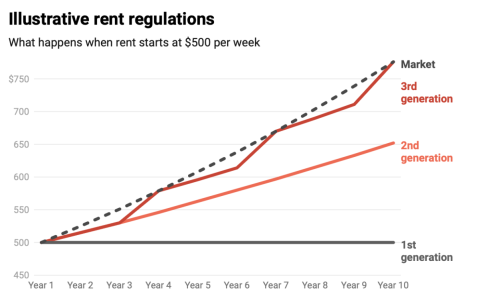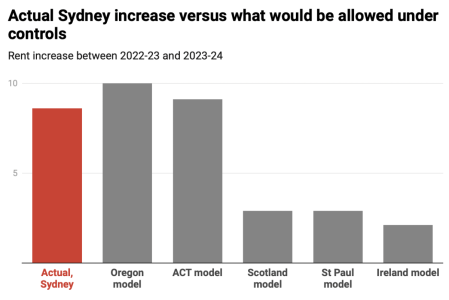Rent regulations are no silver bullet, but they would help make renting fairer
- Replies 9

Dan Peled/AAP
Virtually every week brings news of rising rents or a story of still more renters forced out of their homes by unmanageable rent increases.
The Australian Bureau of Statistics says rents climbed 6.6% in the year to October.
If you’re signing a new rent agreement the situation is worse, with landlords charging on average 8.6% more than they did a year ago, and far more – about 15% more than a year ago – in the hotpots of Sydney and Melbourne.

Michele Bullock expects rents to climb a further 10%. Shutterstock
Reserve Bank Governor Michelle Bullock expects things to get worse before they get better. She says rents are likely to climb by a further 10% in the next six months or so before easing.
None of this need be inevitable. State and territory governments have the power to prevent outsized rent increases and de facto evictions by regulating rents, helping curb the overall rate of inflation in the process.
Research I helped conduct for Shelter NSW and the Tenants Union of NSW finds regulations to prevent excessive rent increases are increasingly common throughout advanced economies including the United States, Canada and much of Europe.
It is often said that rent controls would make things worse for both landlords and tenants by reducing investment in rental properties. But we found that, where designed well, they can help tenants by enhancing security of tenure and improving affordability.
How do rent regulations work?
There are a wide range of approaches, something that is often overlooked.
Some limit rent increases to a fixed percentage annually, ranging from 2% in Ireland to 10% in California. Some limit rent increases to the rate of inflation, although rising inflation has led many jurisdictions to place ceilings on such caps.
And most don’t regulate the initial rent for a tenancy but instead limit increases thereafter, allowing for “vacancy decontrol”.
So-called first-generation controls freeze rents, second-generation controls allow rents to increase gradually, and third-generation controls only limit rents within tenancies, allowing landlords unfettered increases when leasing to new tenants. This graph illustrates these differences.

Source: Regulating rents: international examples & experience. Get the data. Created with Datawrapper
As the graph shows, third-generation controls are less about suppressing growth over time than protecting incumbent tenants from exorbitant increases. This means they are less likely to inhibit supply.
Almost all regulations allow for exceptional rent increases when landlords significantly upgrade rental properties or face increased operating costs. This helps to ensure maintenance is not discouraged.
Some regimes even completely exempt newly-built rental properties, either permanently or for several years, which has the downside of leaving a large chunk of the market unregulated.
How could rent regulation help Australian renters?
We examined five cases of recently introduced rent regulations – in Australia’s ACT, in Ireland, Oregon, Scotland, and St Paul, Minnesota.
Like most of Australia, all had little recent history of rent regulation. Each introduced its controls in the past decade, and all but Ireland in the past five years.
We examined how helpful each of these regulations might have been by comparing each with rent increases in Sydney.
Ireland’s rent cap is the strictest. It limits annual increases to the lesser of 2% or the annual rate of overall inflation annually in a number of designated “rent pressure zones”.
If this cap was in place in Sydney over the past year, a median renter would have saved $1,976. Ireland’s is the only second-generation regime among the five, with the rent cap applying even where tenancies change.
The caps in Scotland and St Paul would have also held down increases in Sydney. Each limits annual increases to 3%, which would have saved the median Sydney renter $1,716 in the past twelve months.
However, Scotland allows exceptional increases to cover maintenance and increased costs of up to 6% and St Paul allows exceptional increases of up to 15% and exempts homes built in the past 20 years. Both “decontrol” between tenancies.
Oregon and the ACT are far more permissive. Oregon prevents rent increases greater than 10% or 7% plus inflation annually (whichever is lower) but excludes homes built in the last 15 years.
The ACT limits increases to 110% of the most recent annual increase in Canberra rents measured by the Australian Bureau of Statistics – a unique model internationally.
Neither would have constrained the median Sydney increase over the past 12 months, although each would have prevented the more excessive increases.

Source: Regulating rents: international examples & experience. Get the data. Created with Datawrapper
Australia’s recent rent increases have been exceptional.
For most of the past decade, each one of the models examined would have permitted increases in line with or a good deal more than those in Sydney.
While they would have prevented unusually large increases, they would have left most landlords unaffected.
One of the aims of Australia’s latest National Housing and Homelessness Agreement is to encourage “security of tenure in the private rental market”.
Unlimited rent increases undermine security of tenure, building a case for Australia’s states and territories to regulate rents.
The examples we have examined show such regulations needn’t be at odds with efforts to increase supply. They show that while rent regulation is no silver bullet, it can help make renting more affordable and secure.
This article was first published on The Conversation, and was written by , Alistair Sisson, Macquarie University Research Fellow, School of Social Sciences, Macquarie University







